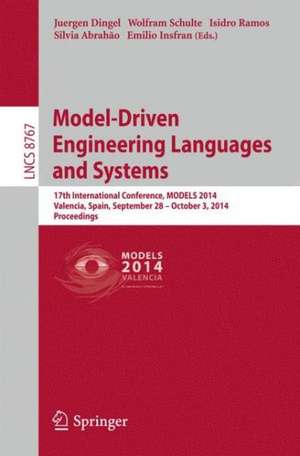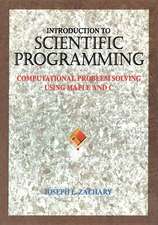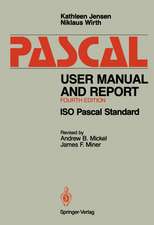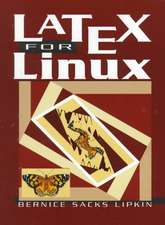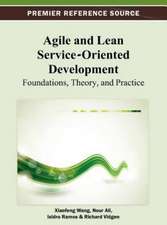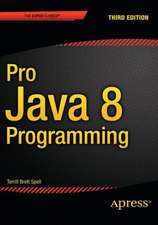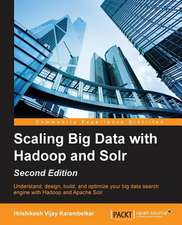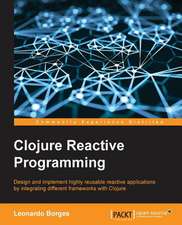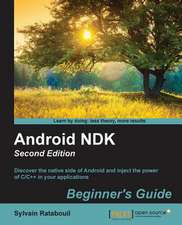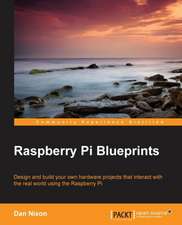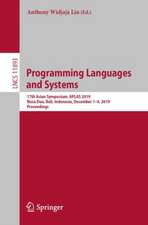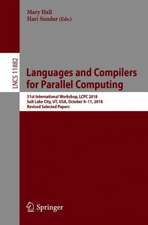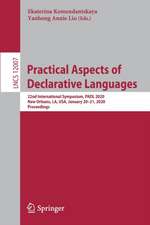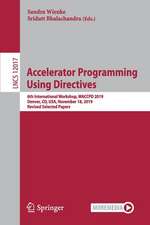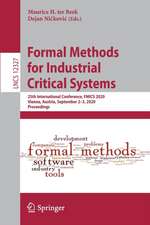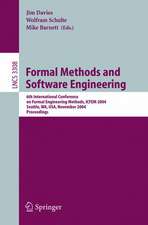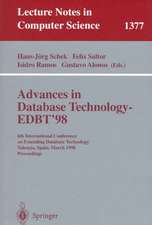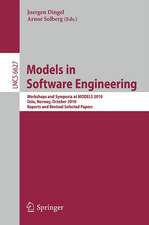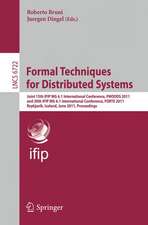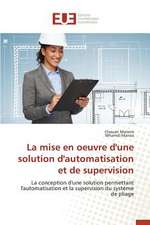Model-Driven Engineering Languages and Systems: 17th International Conference, MODELS 2014, Valencia, Spain, September 283– October 4, 2014. Proceedings: Lecture Notes in Computer Science, cartea 8767
Editat de Juergen Dingel, Wolfram Schulte, Isidro Ramos, Silvia Abrahao, Emilio Insfranen Limba Engleză Paperback – 22 sep 2014
Din seria Lecture Notes in Computer Science
- 20%
 Preț: 1061.55 lei
Preț: 1061.55 lei - 20%
 Preț: 307.71 lei
Preț: 307.71 lei - 20%
 Preț: 438.69 lei
Preț: 438.69 lei - 20%
 Preț: 645.28 lei
Preț: 645.28 lei -
 Preț: 410.88 lei
Preț: 410.88 lei - 15%
 Preț: 580.46 lei
Preț: 580.46 lei - 17%
 Preț: 427.22 lei
Preț: 427.22 lei - 20%
 Preț: 596.46 lei
Preț: 596.46 lei -
 Preț: 449.57 lei
Preț: 449.57 lei - 20%
 Preț: 353.50 lei
Preț: 353.50 lei - 20%
 Preț: 1414.79 lei
Preț: 1414.79 lei - 20%
 Preț: 309.90 lei
Preț: 309.90 lei - 20%
 Preț: 583.40 lei
Preț: 583.40 lei - 20%
 Preț: 1075.26 lei
Preț: 1075.26 lei - 20%
 Preț: 310.26 lei
Preț: 310.26 lei - 20%
 Preț: 655.02 lei
Preț: 655.02 lei - 20%
 Preț: 580.93 lei
Preț: 580.93 lei - 20%
 Preț: 340.32 lei
Preț: 340.32 lei - 18%
 Preț: 938.83 lei
Preț: 938.83 lei - 20%
 Preț: 591.51 lei
Preț: 591.51 lei - 15%
 Preț: 438.59 lei
Preț: 438.59 lei - 20%
 Preț: 337.00 lei
Preț: 337.00 lei -
 Preț: 389.48 lei
Preț: 389.48 lei - 20%
 Preț: 607.39 lei
Preț: 607.39 lei - 20%
 Preț: 1024.44 lei
Preț: 1024.44 lei - 20%
 Preț: 579.30 lei
Preț: 579.30 lei - 20%
 Preț: 763.23 lei
Preț: 763.23 lei - 20%
 Preț: 453.32 lei
Preț: 453.32 lei - 20%
 Preț: 575.48 lei
Preț: 575.48 lei - 20%
 Preț: 585.88 lei
Preț: 585.88 lei - 20%
 Preț: 825.93 lei
Preț: 825.93 lei - 20%
 Preț: 763.23 lei
Preț: 763.23 lei - 17%
 Preț: 360.19 lei
Preț: 360.19 lei - 20%
 Preț: 1183.14 lei
Preț: 1183.14 lei - 20%
 Preț: 340.32 lei
Preț: 340.32 lei - 20%
 Preț: 504.57 lei
Preț: 504.57 lei - 20%
 Preț: 369.12 lei
Preț: 369.12 lei - 20%
 Preț: 583.40 lei
Preț: 583.40 lei - 20%
 Preț: 343.62 lei
Preț: 343.62 lei - 20%
 Preț: 350.21 lei
Preț: 350.21 lei - 20%
 Preț: 764.89 lei
Preț: 764.89 lei - 20%
 Preț: 583.40 lei
Preț: 583.40 lei - 20%
 Preț: 649.49 lei
Preț: 649.49 lei - 20%
 Preț: 341.95 lei
Preț: 341.95 lei - 20%
 Preț: 238.01 lei
Preț: 238.01 lei - 20%
 Preț: 538.29 lei
Preț: 538.29 lei
Preț: 353.20 lei
Preț vechi: 441.49 lei
-20% Nou
Puncte Express: 530
Preț estimativ în valută:
67.58€ • 70.75$ • 55.92£
67.58€ • 70.75$ • 55.92£
Carte tipărită la comandă
Livrare economică 05-19 aprilie
Preluare comenzi: 021 569.72.76
Specificații
ISBN-13: 9783319116525
ISBN-10: 3319116525
Pagini: 716
Ilustrații: XXVIII, 688 p. 227 illus.
Dimensiuni: 155 x 235 x 38 mm
Greutate: 0.99 kg
Ediția:2014
Editura: Springer International Publishing
Colecția Springer
Seriile Lecture Notes in Computer Science, Programming and Software Engineering
Locul publicării:Cham, Switzerland
ISBN-10: 3319116525
Pagini: 716
Ilustrații: XXVIII, 688 p. 227 illus.
Dimensiuni: 155 x 235 x 38 mm
Greutate: 0.99 kg
Ediția:2014
Editura: Springer International Publishing
Colecția Springer
Seriile Lecture Notes in Computer Science, Programming and Software Engineering
Locul publicării:Cham, Switzerland
Public țintă
ResearchCuprins
Cloud, Mobile and Web Computing.- Model-Driven Development of Mobile Applications Allowing Role-Driven Variants.- A Model-Based System to Automate Cloud Resource Allocation and Optimization.- An Evaluation of the Effectiveness of the Atomic Section Model.- Model Transformation 1.- Parsing in a Broad Sense.- Streaming Model Transformations by Complex Event Processing.- On the Use of Signatures for Source Incremental Model-to-text Transformation.- Behavioral Modeling.- Modeling Systemic Behavior by State-Based Holonic Modular Units.- Semantic Model Differencing Utilizing Behavioral Semantics Specifications.- Formalizing Execution Semantics of UML Profiles with fUML Models.- MDE: Past, Present and Future.-Who Knows/Uses What of the UML: A Personal Opinion Survey.- Assessing the State-of-Practice of Model-Based Engineering in the Embedded Systems Domain.- The Relevance of Model-Driven Engineering Thirty Years from Now.- Formal Semantics, Specification and Verification.- Verifying Compilation of Synchronous Distributed Applications.- Environment-Centric Contracts for Design of Cyber-Physical Systems.- Removing Redundancies and Deducing Equivalences in UML Class Diagrams.- Models at Runtime.- A Native Versioning Concept to Support Historized Models at Runtime.- Modelling Adaptation Policies as Domain-Specific Constraints.- Scalable Armies of Model Clones through Data Sharing.- Feature and Variability Modeling.- Three Cases of Feature-Based Variability Modeling in Industry.- Supporting Multiplicity and Hierarchy in Model-Based Configuration: Experiences and Lessons Learned.- Propagating Decisions to Detect and Explain Conflicts in a Multi-step Configuration Process.- Composition and Adaptation.- An MDA Approach for the Generation of Communication Adapters Integrating SW and FW Components from Simulink.- A UML Model-Driven Approach to Efficiently Allocate Complex Communication Schemes.- Model-Integrating Software Components.- Practices and Experience.- Experiences in Applying Model Driven Engineering to the Telescope and Instrument Control System Domain.- Model Driven Grant Proposal Engineering.- Agile Model-Driven Engineering in Mechatronic Systems - An Industrial Case Study.- Modeling for Analysis.- Using UML for Modeling Procedural Legal Rules: Approach and a Study of Luxembourg’s Tax Law.- Resolution of Interfering Product Fragments in Software Product Line Engineering.- Ontology-Based Modeling of Context-Aware Systems.- Pragmatics.- Comprehending Feature Models Expressed in CVL.- On the Impact of Layout Quality to Understanding UML Diagrams: Size Matters.- Enabling the Development of Cognitive Effective Visual DSLs.- Model Extraction, Manipulation and Persistence.- JUMP—From Java Annotations to UML Profiles.- SIGMA: Scala Internal Domain-Specific Languages for Model Manipulations.- A Framework to Benchmark NoSQL Data Stores for Large-Scale Model Persistence.- Model Transformation 2.- Automated Chaining of Model Transformations with Incompatible Metamodels.- Classification of Model Transformation Tools: Pattern Matching Techniques.- Learning Implicit and Explicit Control in Model Transformations by Example.- Querying and Reasoning IncQuery-D: A Distributed Incremental Model Query Framework in the Cloud.- Translating OCL to Graph Patterns.
Textul de pe ultima copertă
This book constitutes the refereed proceedings of the 17th International Conference on Model Driven Engineering Languages and Systems, MODELS 2014, held in Valencia, Spain, in September/October 2014. The 41 full papers presented in this volume were carefully reviewed and selected from a total of 126 submissions. The scope of the conference series is broad, encompassing modeling languages, methods, tools, and applications considered from theoretical and practical angles and in academic and industrial settings. The papers report on the use of modeling in a wide range of cloud, mobile, and web computing, model transformation behavioral modeling, MDE: past, present, future, formal semantics, specification, and verification, models at runtime, feature and variability modeling, composition and adaptation, practices and experience, modeling for analysis, pragmatics, model extraction, manipulation and persistence, querying, and reasoning.
